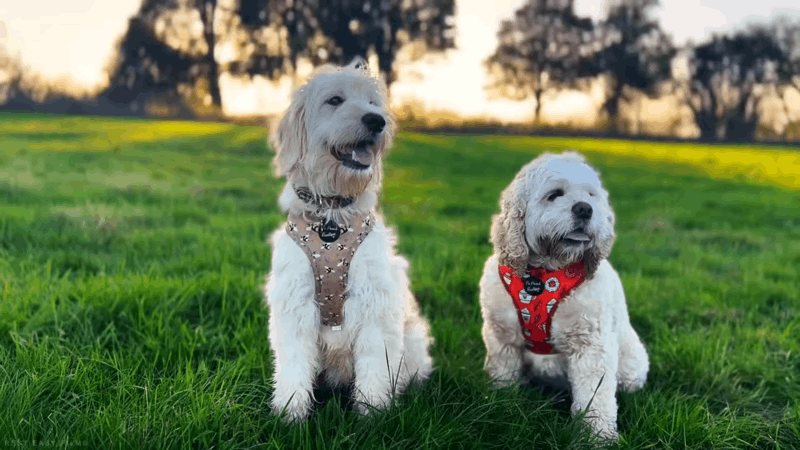No products in the cart.
As our beloved canine companions age, they may face various health challenges and CBD for dogs with dementia is emerging as a promising natural remedy to help manage their cognitive decline. Similar to humans, dogs can also experience cognitive decline as they grow older, leading to a condition known as canine dementia or canine cognitive dysfunction (CCD).
In this blog, we will explore the potential benefits of using CBD oil dog for dementia and shed light on important considerations for pet owners seeking alternative approaches to support their furry friends’ cognitive well-being.
What is Dementia in Dogs?

Canine cognitive dysfunction, another name for dementia in dogs, is a neurological disorder that progressively impairs cognition, memory, and behavior. It is similar to Alzheimer’s disease in humans and can cause confusion, disorientation, changes in sleep patterns, and decreased responsiveness to their surroundings.
The Symptoms of Dementia in Dogs
Dementia is a condition that affects aging dogs and can result in various symptoms. Here are some common symptoms of dementia in dogs
- Disorientation: Dogs with dementia may exhibit confusion and disorientation, even in familiar surroundings. They may become disoriented in their own home or yard, appear confused of where they are, or have difficulties navigating.
- Changes in social behavior: Dogs with dementia may display alterations in their social interactions. They might become withdrawn, show decreased interest in their surroundings, or exhibit changes in their relationship with family members or other pets. They may also become more irritable or aggressive.
- Memory loss: Similar to humans with dementia, dogs may experience memory loss. They may forget familiar commands or training cues they once knew well. They may also forget where their food and water bowls are located or how to navigate their regular routines.
- Increased anxiety or restlessness: Dogs with dementia may exhibit heightened anxiety or restlessness. They may pace or wander aimlessly, appear restless during sleep, or exhibit signs of restlessness during the night. This can lead to sleep disturbances for both the dog and their owners.
- Loss of house-training skills: Another common symptom of dementia in dogs is a regression in house-training. Dogs may have accidents indoors despite previously being reliably trained. They may also exhibit increased frequency and urgency to urinate or defecate.
Please keep in mind that these symptoms can also be caused by other medical diseases, so if you feel your dog is suffering from dementia, contact a veterinarian for an exact diagnosis.
The Causes of Dementia in Dogs
The specific origins of dementia in dogs are unknown, although various variables are thought to contribute to its development. Here are some potential causes
- Age-related brain changes: the primary risk factor for dementia in dogs is aging. Dogs’ brains naturally deteriorate with age, developing plaques and tangles akin to Alzheimer’s disease in people. These changes impair brain function and lead to cognitive decline.
- Genetic predisposition: Certain dog breeds, like Cocker Spaniels, Beagles, and Boxers, have a higher risk of developing dementia. This suggests a role of genetics in its development.
- Oxidative stress: An imbalance of free radicals and antioxidants causes oxidative stress, which damages brain cells and contributes to cognitive loss. Factors like environmental toxins, inflammation, and poor diet increase oxidative stress in dogs, potentially raising the risk of dementia.
- Chronic inflammation: Ongoing inflammation in the body adversely affects the brain. Conditions such as infections, autoimmune disorders, and age-related immune system dysregulation cause inflammation that contributes to cognitive decline.
- Environmental factors: Exposure to toxins like pesticides, heavy metals, and pollutants increases the risk of cognitive dysfunction in dogs. In addition, aged dogs’ cognitive decline may be influenced by a lack of social connection, mental and physical stimulation, and environmental enrichment.
Because of its complexity, further study is required to completely comprehend its causes and create efficient therapies. It is advisable to visit a veterinarian for a precise diagnosis and the best therapeutic options if you believe your dog may be experiencing cognitive impairment.
What to Consider when Using CBD for Dogs with Dementia?

When using CBD for dogs with dementia, it’s crucial to consult a healthcare professional for safety and suitability. Factors like CBD quality, dosage, medication interactions, and individual response must be considered before starting treatment.
The Side Effects of CBD for Dementia in Dogs
It’s important to be aware of potential side effects if you are considering using CBD for dementia in dogs. Although CBD is typically well taken by dogs, some canines may have minor adverse effects such as sleepiness, dry mouth, or changes in appetite.
It is essential to remember that individual dogs may react differently to CBD for dementia, and not all dogs will experience these side effects. Starting with a low dosage and closely monitoring the dog’s response can help minimize the risk of side effects. Do not forget to talk with a veterinarian to get useful advice before providing any types of CBD products for your dogs.
The Importance of Consult a Veterinarian Before Providing Dogs CBD for Dementia
Consulting a veterinarian before giving CBD for dogs with dementia is crucial for several reasons. Veterinarians are qualified to evaluate the dog’s particular illness and decide whether CBD is an effective therapy option. They can provide guidance on proper dosage, potential interactions with other medications, and monitor for any adverse effects.
Ensuring the dog’s safety and well-being is paramount, and a veterinarian’s input is invaluable in making informed decisions about using CBD for dementia in dogs.
Which CBD is Best for Dementia?

Determining the best CBD product for dementia in dogs is a decision that should be made in consultation with a veterinarian. However, when considering CBD options, it is generally recommended to look for the following qualities:
- High-quality and reputable brands: Choose CBD products from trusted manufacturers that provide third-party lab testing to ensure product quality, purity, and accurate CBD concentration.
- Full-spectrum CBD: It includes a variety of cannabinoids, including small amounts of THC, which may have synergistic effects. These additional compounds can potentially enhance the therapeutic benefits of CBD.
- Proper CBD dosage: It’s important to follow the recommended dosage guidelines provided by the veterinarian. The dosage may change depending on the dog’s size, weight, and specific requirements.
- CBD oil or tinctures: CBD oil or tinctures allow for precise dosing and can be easily administered to dogs by mixing them with food or applying directly into their mouth.
Remember, every dog is unique, and the effectiveness of CBD may vary. Regular monitoring of the dog’s response and consultation with a veterinarian can help determine the most suitable CBD product and dosage for your dog’s specific condition.
CBD for Dogs with Dementia

CBD oil has gained attention as a potential treatment option for dogs with dementia due to its therapeutic properties. CBD, or cannabidiol, is a compound derived from the cannabis plant that has shown promise in managing various health conditions.
The Advantages of Using CBD for Dogs with Dementia
When used for dogs with dementia, CBD oil offers several advantages
- Neuroprotective effects: CBD has been found to have neuroprotective properties, which means it may help protect and preserve brain cells from damage. This can potentially slow down the progression of cognitive decline in dogs with dementia.
- Anti-inflammatory properties: CBD has anti-inflammatory qualities that may help lessen brain inflammation. Chronic inflammation is known to be a factor in cognitive decline, and CBD oil for dogs may aid with some dementia symptoms by lowering inflammation.
- Anxiolytic and calming effects: According to reports, CBD oil possesses relaxing and anxiolytic properties that could help dementia-affected dogs feel less anxious and more at ease.
It cannot be denied that CBD oil brings many benefits for our beloved companions, however, before giving this product to dogs, you should consider carefully and ask the advice of a veterinarian.
The Recommended CBD Oil Dosage for Dementia
Determining the appropriate CBD oil dosage for dogs with dementia is important to ensure safe and effective treatment. However, there is no standard dosage as it can vary based on factors such as the dog’s weight, individual response, and the specific CBD product being used.
It is strongly recommended to consult with a veterinarian who can provide personalized dosage recommendations for the dog’s specific condition.
How Can CBD Oil be Used to Help Dogs with Dementia?
CBD oil can be used to help dogs with dementia by:
- Supporting brain health: CBD oil’s neuroprotective properties may help slow down cognitive decline and support overall brain health in dogs with dementia.
- Reducing anxiety and agitation: The anxiolytic and calming effects of CBD oil can help alleviate anxiety and restlessness commonly seen in dogs with dementia.
- Enhancing quality of life: CBD oil may enhance the general well-being and quality of life for dogs suffering from dementia by addressing the symptoms connected with the condition.
It’s vital to remember that CBD oil should be used as part of a thorough treatment plan for dementia in dogs. Regular monitoring and discussion with a veterinarian are crucial to guarantee its efficacy and safety.
CBD Oil and Dementia: Is It Safe?

Before giving CBD for dogs with dementia, it’s necessary to talk to a veterinarian because research on its safety in treating canine dementia is still ongoing.
Although CBD is generally regarded as safe for dogs, specific considerations like the dog’s overall health, any drugs they may be taking, and potential interactions must be made. A veterinarian can provide guidance on appropriate dosage, potential risks, and monitor the dog’s response to CBD treatment.
Conclusion
CBD for dogs with dementia holds potential as a complementary therapy to support cognitive function and manage behavioral symptoms. By supporting brain health and alleviating distressing symptoms, CBD can significantly improve the quality of life for both dogs and their owners. It should only ever be used with professional supervision as more study is required to determine its efficacy and safety.
Hello, I am Hazel Bennett, an experienced copywriter specializing in the fascinating topic of CBD for dogs. With a passion for pet wellness and extensive knowledge of CBD’s potential benefits, I am here to provide you with informative and engaging content.




Thank you for sharing your thoughts. I really appreciate your efforts and I am waiting for your further post thanks once again.